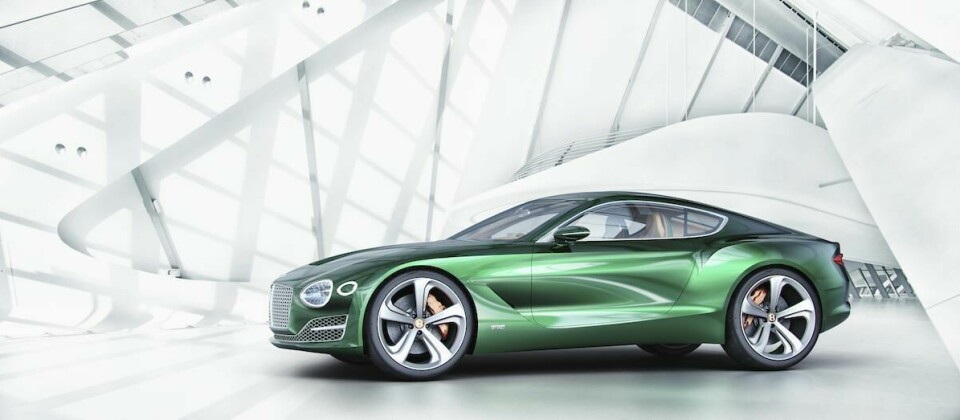
Q&A: Stefan Sielaff on reinventing Bentley
Bentley design director on balancing old and new in a vastly changing world
Mushrooms inside a Bentley would normally be a sign that your barn-find classic is in need of an expensive restoration, but the company is currently pondering whether to introduce the friendly fungus on purpose. Mushroom-based leather, along with equally unlikely jellyfish leather, could be on the menu for future luxury interiors, according to Bentley Motors director of design Stefan Sielaff.
Speaking at the FT Future of the Car Summit held in London last week, Sielaff said that new materials will be needed to satisfy the growing tranche of customers living a vegan, cruelty-free lifestyle. “You can’t sell them a Bentley with 20 leather hides inside,” he told delegates. “We’ve been talking to these customers – in California especially – and they are asking, ‘What can you give us?’ We want to satisfy these customers, because they are the peak of a trend. We are working on it now, and we’ll present a Bentley vegan concept.”

MuSkin has created a “mushroom leather” – ideal for vegans
He added that the designer’s role is to spot looming trends long before they become overwhelming. “We are a little bit like surfers – it’s part of our job to spot waves very, very early.”
The summit explored a broad range of influences, from new materials and new production processes to alternative powertrains and autonomous technology; assessing the likely impact on society, industry and the economy.
Speaking exclusively to CDN at the summit, Sielaff said these topics are of vital importance to designers. “You can only do a big step in design with a big step in technical innovation, otherwise you are cooking the same soup again and again,” he explained. “Progress in manufacturing processes is also important, because you can design a lot but somehow it has to be produced.”

Bentley are beginning to respond to rapidly-growing EV startups
Innovation also brings the potential for disruption, with tech-heavy start-ups like Tesla, Lucid Motors and Faraday Future all aiming to lure well-heeled customers away from traditional brands. Sielaff argued that for established OEMs like Bentley to prosper, they must be prepared to continually challenge their own assumptions. “We do it. We disrupt ourselves because we have to,” he said. “We can’t sit in the bathtub of tradition and wait to see if the water stays warm or gets colder. We have to reinvent ourselves.”
As well as catering for the needs of vegans, Bentley hopes to broaden its appeal in many other ways, though Sielaff admits the brand has to tread very carefully. “A luxury brand like Bentley, with its big heritage, shouldn’t create brutal shockwaves,” he observed, adding that the company can’t afford to lure a younger demographic, for example, at the expense of its established customer base. “We need a very clear strategy of doing one step after another.”

Sielaff described the EXP 12 Speed 6e, a concept electric roadster revealed at the Geneva show this year, as “a bridging scenario, digestible for the spectra of our audience”. It was a very short stride forward from the EXP 10 Speed 6 hybrid coupe shown two years earlier, but Sielaff argued that the Speed 6e is as much as five or six years behind work currently in the studio. The EXP 10’s design certainly predated Sielaff’s June 2015 arrival at Bentley.
The brand’s progress has been accelerated by Bentley’s ties with Porsche and Bugatti within the VW Group, Sielaff said. “The main focus is on Porsche,” he added. “You will see the first results in the autumn when we show the new Continental GT.”
Sielaff also said augmented reality – where digital imagery is added to the driver’s view through the windscreen – is a technology of great interest for Bentley. “Screens at the moment, whether they are touchscreens or information screens, are definitely a trend; you have to have them or you look outdated, but I’m sure we won’t drive around in the future with a lot of screens in front of us,” he predicted. “We overcome the situation of being overfed with information with the new Continental, in a very British and charming way, if not the most technological one. But I think with augmented reality we will have the chance to really get the information you need or want.”

An autonomous Bentley could swap a chauffeur for a virtual butler…
Among other topics, the summit addressed the issue of fully autonomous vehicles (AVs). Maarten Sierhuis, director of Nissan’s Silicon Valley Research Center, gave a cautionary presentation suggesting that fully self-driving cars might be further off than many think, not least because some of the sensors used in today’s experimental AVs cost $80,000 apiece.
Bentley’s customers are less price-sensitive than most, suggesting that it could be well-placed to take the lead in autonomous technology within the larger VW Group. Sielaff also observed that new technology has always trickled from the top downwards in the automotive sector. “I personally believe very much that Bentley could find customers who already have 20 cars in their garage to be a bit more experimental,” he said. “Our customers are intelligent and open minded, so it’s ideal.”
As well as technological barriers, Sielaff observed that AVs must also overcome less tangible hurdles. “In a train or a plane, where we’re not involved in the activity of moving, we accept that, funnily enough… but in a car, especially when it’s not a person but only technology doing the driving, there will be a psychological barrier,” he predicted. “Eyes-off will be very difficult to learn, though young people will adapt to it better.”

Quipping that Bentley customers have enjoyed autonomous cars for 98 years (thanks to chauffeurs), Sielaff noted that shared mobility services also represent a big opportunity for luxury brands. While wealthy customers will of course want to own their own cars, they are also likely to embrace a Bentley club service that, for example, might meet them at the airport and whisk them to their hotel, whether the limos used are human-driven or autonomous.
Artificial intelligence will not be limited to driving, of course, and Sielaff said Bentley is already exploring the potential of the digital butler – a system that recognises you when you climb aboard, knows your wishes and your habits and can act accordingly, for example suggesting tables at suitable restaurants.
“I think in the future we will have to separate very clearly our car-sharing models from our ownership models,” Sielaff added. “Ownership will still exist and the design will be very individual – maybe even more individual for owners than it is today.”



